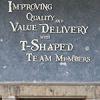 |
Introspection and the Postmortem How you handle a postmortem depends on your leadership approach, the culture of your organization, and, of course, your own personal strengths. This article will consider how positive psychology can help you conduct more effective postmortems that lead to process improvements and more effective organizations.
|
|
 |
What Is Release Management, and Why Is It Needed? This article talks about what release management is, then tells you how to implement the concepts in an organization by explaining what skills are needed, how release managers work within a team, and how the process is related to continuous integration.
|
|
 |
Chasing Mavericks: Using Rolling Wave Planning to Transform Agile Teams By using an approach similar to that used by surfers to catch waves, you can effectively help your team transition to agility. Scott presents a four-stage process that alternates training with coaching and doing with learning.
|
|
 |
Using Positive Psychology to Motivate Your Team Managers often need to spend a considerable amount of time ensuring that their team members are motivated to do the best work possible. While pay, benefits, and a flexible work environment are often put forth as a key reason to apply for a job, how do you effectively motivate employees to be their best even under difficult circumstances?
|
|
 |
Improving Quality and Value Delivery with T-Shaped Team Members Thomas Wessel presents how T-shaped and pi-shaped teams based on each member's span of knowledge, ability to collaborate, and depth of expertise play an important part in how effectively your team performs.
|
|
 |
Positive Psychology and Learning from Mistakes Mistakes happen. But team members can engage in very dysfunctional behavior after they have made mistakes—often because their organizations punish mistakes and cause damage trying to cover them up. Here’s what we learn from positive psychology about creating an environment where employees can be empowered to address their mistakes in an open, honest manner.
|
|
 |
Myth 31: I Don’t Have to Make the Difficult Choices "Don't bring me problems; bring me solutions." Sound familiar? Sounds like a management cop out to Johanna Rothman. A primary purpose of managers is to help their teams perform to the best of their abilities, and that includes stepping up and making tough decisions to help solve problems.
|
|
 |
Management Myth 30: I Am More Valuable than Other People Just because you have a fancy job title doesn't mean you can manage your team members by bossing them around. Servant leadership is an important skill for managers, as the best managers are those who serve the people who work for them.
|
|
 |
Using Positive Psychology in DevOps Bringing different technology groups together can result in some interesting challenges. We often feel like we are doing group therapy for a very dysfunctional family, and many of the challenges encountered highlight the biases people often bring into the workplace. Leslie Sachs describes how to identify these behavioral issues and utilize positive psychology to help develop high-performance teams.
|
|
 |
QA Management: All Bark and No Bite? Mike Talks shares with us the unlikely story of how his pet German Shepherd inadvertently became his team's QA manager. Talks explains how his German Shepherd was able to gather people together and have them talk to each other, similiar to what a QA manager does—keeping people on task, handing out assignments, and following up with team members.
|
|

